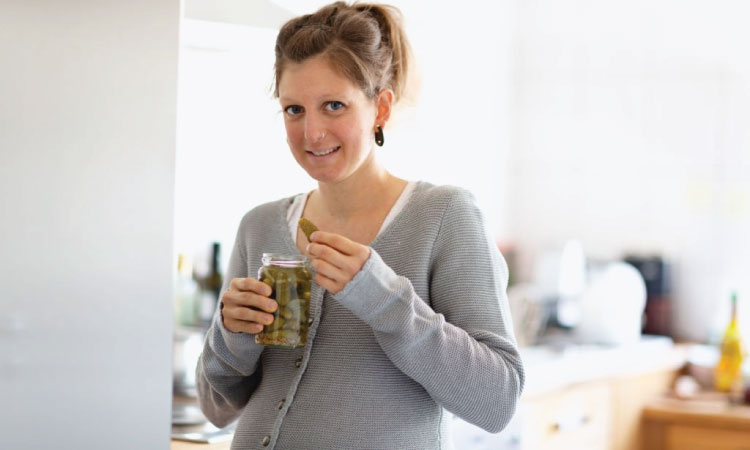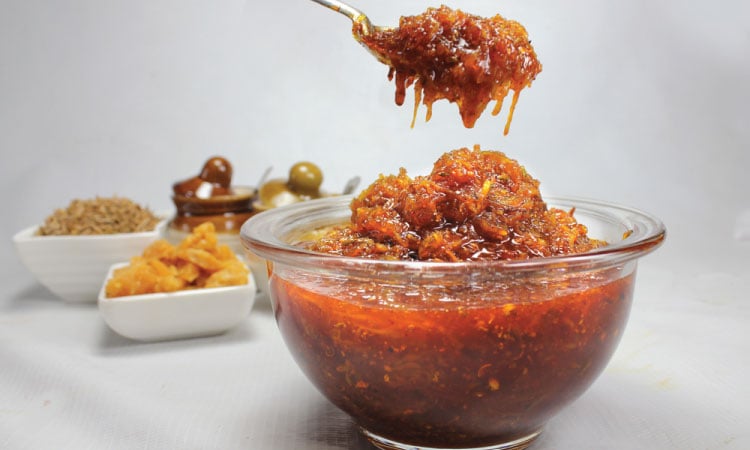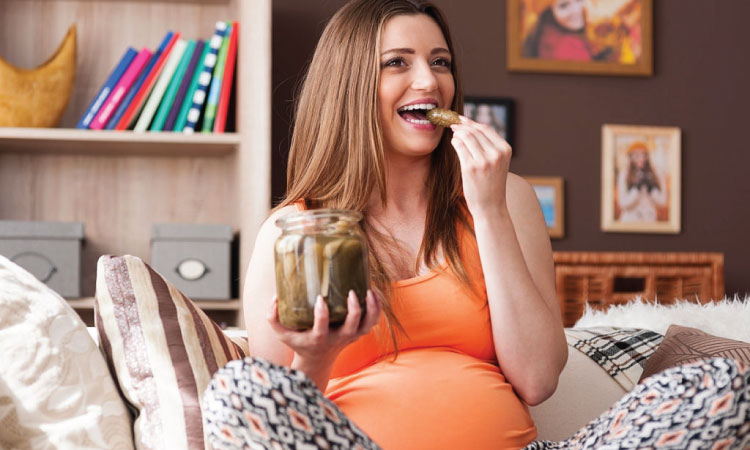Isn’t pregnancy famous for food cravings? Sweet, spicy, salty, tangy- and even weird combinations. However, not all food cravings support the healthy progression of pregnancy. Cravings for tangy pickles during pregnancy come under most craved food items during pregnancy. And why not!
While many pregnant women crave pickles throughout their pregnancy, for some soon-to-be mothers, eating pickles is one of the effective ways to get rid of morning sickness. From mango to mixed vegetables and from fish to meat, pickles come in different varieties to satisfy the mothers’ pickles craving during pregnancy.
However, there are some important points to remember when it comes to eating pickles during pregnancy. This article helps you to understand everything you need to know about eating pickles during pregnancy.
Are Pickles Good During Pregnancy?
Pickles have relatively very less nutritional value when compared to fresh fruits and vegetables. Therefore, rather than evaluating them for their nutritive aspect, we can evaluate their safety during pregnancy. Because, as already said pregnant women are mostly not able to turn down their urge for pickles during pregnancy.
Limited consumption of pickles normally does not pose any threat to the mother and baby in the womb. However, if the mother has some underlying health condition it is compulsory to ask the doctor before including it in the pregnancy diet.
Also never turn it into a regular habit. This means you should not lay your hands on pickles whenever you crave them during pregnancy. You can talk to your doctor and find out how much and how frequently you can have pickles when you crave it.
Related Reading: Top 10 Food Cravings When Pregnant With A Girl
Not all pickles are good for pregnancy, even if you take them in limited quantity. There are pickles to avoid during pregnancy which we explain in the latter part of this article. Try to eat homemade freshly prepared pickles in which the salt and spice are customized for pregnant mothers.
Calculate Due Date With LMP
What Does Craving Pickles When Pregnant Mean?

Many women wonder “is it normal to crave pickles during pregnancy”. Our answer is yes, it is quite normal. Even though there are no strong scientific bases, there are many theories regarding food cravings during pregnancy.
Some experts believe the hormonal and psychological changes that happen during pregnancy is the cause of food cravings. Pregnancy hormones heighten the sense of taste and smell. And pickles may be able to satisfy their heightened senses of taste or smell. This could be one of the reasons for craving pickles during pregnancy.
On the other hand, according to some, it can be an indication of her changing nutritional needs. This means, expecting women may develop a craving for food that is high in a particular nutrient if they themselves have a deficiency. Therefore, you should listen to your pregnancy cravings.
Now coming to craving pickles during pregnancy, let us guess which element is more in pickles- doubtlessly we can say it is sodium. The blood volume increases to 50% during pregnancy. This increases the demand for sodium. That is why most of the pregnant woman craves pickles at some point of pregnancy.
Are There Any Health Benefits Of Eating Pickles During Pregnancy?
Although pickles do not have much to offer in the name of nutritional value, there are a few benefits it can stake its claim on. Here they are:
1. Pickles during pregnancy help to combat nausea and morning sickness
Nausea and morning sickness are common problems that take a toll on women during their pregnancy. Many expecting women have said that eating pickles helps them to deal with these two problems. Brine or vinegar is the base of pickles. This can help with pH balance thereby helps to fight nausea. Lemon pickle during pregnancy is found really good to curb morning sickness
2. Helps maintain the proper balance of electrolytes in your body
Pregnancy is one of those times during which electrolytic balance is crucial. Electrolytic imbalance can trigger many complications during pregnancy. Potassium and sodium are the two main electrolytes in our body. During pregnancy, the requirement for electrolytes increases. Pickles are considered to be one of the good sources of electrolytes.
3. Pickles during pregnancy help with digestion
Digestive issues are quite common during pregnancy. Pickles hold good bacteria that prevent them from getting spoiled. Therefore, eating pickles during pregnancy in a limited quantity may help to increase good gut bacteria. This helps to get rid of many digestive issues.
Related Reading: Top 10 Protein-Rich Foods For Pregnancy
4. Pickles do offer some vitamins and minerals
Pickles are made with fresh fruits and vegetables. Even though it won’t carry as many vitamins and minerals as in the fresh fruits and vegetables, the pickled form of vegetables and fruits still contains vitamins and minerals that are beneficial for pregnancy.
Risks And Precautions Of Eating Pickles During Pregnancy

Limited intake of pickles during pregnancy may not be harmful. However, it is better not to make it a part of the daily diet during pregnancy. Excessive intake of pickles during pregnancy can lead to certain health issues.
Risks associated with pickles
Here are some of the risks associated with eating pickles during pregnancy
1. Increased risk of dehydration
Excessive intake of pickles increases the risk of dehydration. This is one of the most important side effects of eating pickles during pregnancy. Pickles are loaded with sodium. Increased salt level (sodium level) can make the body get dehydrated. That is why it is said to plenty drink water if you are having pickles.
Drinking lots of water helps to maintain the ideal sodium level in the body by flushing out excess sodium through urine. Dehydration is very dangerous not only for the expecting mother but also for the developing fetus.
2. Pickles increase the risk of gestational hypertension
Eating pickles during pregnancy should be avoided if you are experiencing gestational hypertension. Let go of pickle from your plate if you are prone to or have a previous history of gestational hypertension.
Pickles are loaded with salt and excessive intake of salt hikes the blood pressure. High blood pressure during pregnancy can bring about many serious complications and can put the whole pregnancy at risk. Therefore, excessive consumption of pickles during pregnancy increases the risk of gestational hypertension.
3. Pickles during pregnancy can trigger heartburn
Pregnant women are prone to heartburn. Pregnancy hormones relax the lower esophageal sphincter. This increases the chances of bile or stomach acids to flow back into the esophagus. Vinegar is one of the main ingredients of pickles. Vinegar, as we all know, is acidic. Therefore, eating pickles during pregnancy can worsen or trigger heartburn or acidity in many mothers.
4. Pickles have too much oil
Some pickles contain excessive oil in them. Those pickles use oil as the main preservative because oil is the best medium to prevent the pickled vegetables and fruits get in touch with air and moisture. It is not wise to consume such pickles during pregnancy as it could increase cholesterol and fat levels which may lead to serious complications.
5. Premature delivery due to excessive salt intake
Excessive salt intake can impede the functioning of the kidneys. This, in turn, can lead to insufficient oxygen supply to the fetus. According to studies, reduced kidney function increases pregnancy complications. It is found that renal issues can increase the odds of preterm delivery by 52%. Moreover, it can potentially increase premature births of less than 20 weeks by ten-fold.
6. Can increase sodium levels
Extremely high sodium levels in the mother’s body can adversely affect fetal growth and development. Pickles contain a very high amount of sodium. If taken regularly over a period of time, excessive intake of pickles can increase the sodium level drastically.
Related Reading: 18 Foods To Eat To Increase Fetal Weight During Pregnancy
This can not only induce high blood pressure and dehydration in mothers but also can affect the development of your unborn baby’s kidneys. Moreover, high sodium levels during pregnancy can increase the risk of a baby acquiring high blood pressure in later years.
7. Pickles during pregnancy can trigger gastric issues
Pickles during pregnancy can trigger gastric issues like bloating and dysentery. Therefore it is best to steer clear of pickles during pregnancy if you have a sensitive stomach.
Precautions to take when eating pickles during pregnancy

Here are some of the things to keep in mind while eating pickles during pregnancy. Taking these steps reduces the side effects of eating pickles during pregnancy.
1. Read labels carefully
While purchasing pickles from a store, read the labels carefully. Sodium, fat, and calories vary with different brands. Make sure all these are relatively less in the product you buy. During pregnancy try to choose pickles that are made from organic items.
It is also important to note the expiry date. Make sure there is a lot of time before the expiry date. Never buy pickles that have chemical preservatives. Chemical preservatives even less quantity are dangerous for the fetus.
2. Drink plenty of water
Drink plenty of water when you eat pickles during pregnancy. This will reduce the risk of dehydration significantly.
3. Dry out excess oil
Some pickles contain high oil content. It is not at all healthy to consume that much oil. Drain out the oil content from these kinds of pickles before consuming.
4. Refrain from consuming pickles daily during pregnancy
Daily consumption of pickles during pregnancy is not good. It is better to find an alternative for pickles. This might eventually reduce the craving for pickles.
Types Of Pickles Not To Consume During Pregnancy
- Avoid pickles that come without proper labeling from local stores. Remember, unpasteurized pickles during pregnancy are not safe
- Avoid canned pickles that contain preservatives. They can be harmful to the pregnant woman and the unborn baby
- Avoid consuming mango pickles as mango pickle has increased risk of having listeria bacteria that are potentially dangerous during pregnancy. If you crave mango pickles, go for freshly homemade ones
- Some pickles contain excessive sugar content. Sweet and sour pickles taste good. But, avoid consuming these types of pickles. Sugar, in any form, is not good during pregnancy
Types Of Pickles To Consume During Pregnancy

- Choose pickles that are sour and less salty and spicy to satisfy the pregnancy cravings
- Always homemade pickles are relatively safe to consume during pregnancy than their commercial variety
- Freshly made pickles are a safe bet during pregnancy
Who Are Not Supposed To Eat Pickle During Pregnancy?
Expecting women who are experiencing digestive issues should not eat pickles during pregnancy as it can aggravate the issues. Likewise soon-to-be-mothers who are experiencing gestational hypertension should also refrain from eating pickles during pregnancy.
Conclusion
Cravings are a part of pregnancy, and pickles are one of the most common pregnancy cravings. They are spicy and sour, making them perfect to satiate pregnancy cravings. Indian pickles, or achar, especially have that combination of sour and spicy.
There are benefits to eating pickles, especially if they are homemade pickles during pregnancy. They have many vitamins and minerals, and they can alleviate some pregnancy-related issues like digestive problems and morning sickness.
However, there are risks to eating pickles during pregnancy. Try to consult your doctor before including pickles in your diet, and remember to only have moderate amounts.

